CDC says vaccinated children and teachers won't need masks in class this fall
Schools can safely return to in-person learning in the fall, even as they prepare to welcome back students too young to be vaccinated against COVID-19, according to updated guidance released Friday by the Centers for Disease Control and Prevention and masks won't be necessary in the classroom for teachers and students who have been vaccinated, a CDC spokesperson said.
With available vaccines so far authorized only for children as young as 12 years of age, the guidance, which was last updated nearly two months ago, acknowledges that K-12 schools may have student bodies with mixed vaccination statuses. Regardless, the agency stressed that "the order in which prevention strategies are added or removed should be driven primarily by the goal to keep schools safely open."
For those who are eligible, the agency emphasizes that vaccination is the best prevention strategy. But the rollout has been slow so far, with less than a quarter of 12- to 15-year-olds and just over 36% of 16- and 17-year-olds fully vaccinated nationwide.
For students and staff who are unvaccinated, the CDC recommends wearing a mask indoors and in crowded outdoor settings. The agency also reiterated earlier guidance for the general public that masks will continue to be required on public transportation, like school buses.
In an interview with CBS News, American Federation of Teachers President Randi Weingarten applauded the new guidance.
"There are four or five big pieces to it, but it makes it clear that in-school learning is really important, which we made clear and have been making clear for months and months and months," she said. "We needed to be able to plan for school this fall and this gives us a blueprint for doing that."
Another, more contentious mitigation strategy included in the guidance is social distancing of at least three feet for those who are unvaccinated, although the agency notes that schools, "should not exclude students from in-person learning to keep a minimum distance requirement." In an interview with CBS News, Erin Sauber-Schatz, head of the agency's Community Interventions and Critical Populations Task Force, acknowledged that's a mitigation measure that can be reeled in.
"We're feeling confident that the science is in a place now that as long as the other prevention strategies are in place, that distancing is something that we can start to pull back on a little bit but we still encourage closely monitoring to make sure there isn't increases in cases," she said.
However, some states have already dispensed with those other preventative strategies. In Iowa and Texas, school districts have been barred from instituting mask mandates, which has been one tool used by administrators to lessen the spread of the virus, in the event of significant transmission. If a school doesn't maintain masking, Sauber-Schatz says the agency recommends implementing physical distancing.
"We do know that masks continue to be effective at preventing the spread of COVID-19 and it's still one of our critical prevention strategies that we recommend," she said.
Weingarten said it's discouraging to see some governors put politics above public health and that it's "ironic" that conservative states that defend states' rights "for political reasons, take away that local decision-making from those localities."
Nationwide, new cases have crept back up, particularly among the most vulnerable counties with low vaccination rates. At a COVID Response briefing Thursday, CDC Director Dr. Rochelle Walensky said 93% of the counties with the highest level of transmission had vaccinated less than 40% of their residents. In Springfield, Missouri, where COVID hospitalizations in the region have more than doubled in the last month, the local school district reinstituted a mask mandate for summer schools.
Missouri is also a hotbed for the more transmissible Delta variant, which the CDC estimates makes up more than 70% of new cases there and more than 50% of new cases nationwide. In its guidance, the CDC says current vaccines are effective against all circulating variants but will "continue to monitor variants to see if they have any impact on prevention strategies and how COVID-19 vaccines work in real-world conditions and will update guidance accordingly."
While Sauber-Schatz underscored that the agency is confident that schools can safely maintain in-person learning this fall, she said the agency recommends that immunocompromised children and their families work with their school district to see if remote options are available.
"That is something that would have to be determined at the local level," she said.
In a statement, U.S. Secretary of Education Miguel Cardona said his department will continue to work in collaboration with the CDC and local officials to ensure that "all students have access to full-time, in-person learning this fall."
"We know that in-person learning offers vital opportunities for all students to develop healthy, nurturing relationships with educators and peers, and that students receive essential supports in school for their social and emotional wellbeing, mental health, and academic success."



